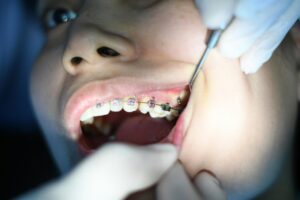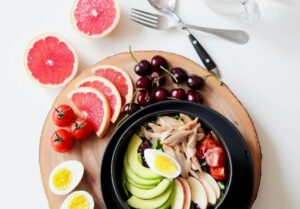Dealing with braces and mouth sores at the same time isn’t fun. It makes eating feel like a challenge instead of something enjoyable. The types of food you choose can help ease the discomfort—or make things worse. That’s why it’s important to know which foods to avoid with braces when your mouth is already feeling sore.
Braces can rub against the inside of your cheeks, lips, or tongue. That friction often leads to small sores or irritation. Combine that with the pressure from recent adjustments, and your mouth could use a break. Eating the wrong foods during this time can make healing slower and even increase your chances of damaging brackets or wires.
Here’s what causes these sore spots and what you can do about them.
Top Foods to Avoid With Braces and Mouth Sores

When your mouth is sore, the last thing you need is food that makes things worse. Certain textures and ingredients can cause more irritation or even damage your braces. Choosing the right meals starts with knowing which ones to skip.
This is where it really matters to understand the common foods to avoid with braces. Avoiding these can help your mouth heal faster and keep your orthodontic treatment on track.
1. Hard and Crunchy Foods
-
Raw carrots
-
Nuts
-
Chips
-
Popcorn
These can poke, scratch, or crack your braces. They also make chewing painful when your mouth is already sore.
2. Sticky and Chewy Snacks
-
Caramel
-
Gum
-
Taffy
-
Gummy candies
Sticky foods get trapped around brackets and are hard to clean out. They can also pull at wires or loosen them.
3. Spicy or Acidic Items
-
Hot sauce
-
Tomatoes
-
Vinegar-based dressings
These kinds of foods can sting or burn when they come into contact with mouth sores.
4. Crunchy Bread and Crackers
-
Toast
-
Hard rolls
-
Crusty baguettes
Even something as simple as dry toast can rub against sore spots and increase irritation.
5. Sugary Treats
-
Soda
-
Candy
-
Sweet cereals
Sugar increases the risk of plaque around your brackets. When your mouth is sore, it’s harder to clean thoroughly, which makes sugar more of a problem.
Keeping a list of foods to avoid with braces can make eating less stressful. Post it on the fridge or keep it in your phone as a quick reminder when planning meals or snacks.
Gentle and Braces-Friendly Foods to Eat
When your mouth feels sore, soft and soothing foods can help you stay comfortable while still getting the nutrients you need. The goal is to avoid anything that puts extra pressure on your teeth or rubs against irritated areas. Instead, focus on meals that are easy to chew and gentle on your gums.
It’s also a good idea to stock up on safe alternatives, so you’re not tempted to reach for foods to avoid with braces.
Soft, Cool Foods That Soothe
These are great during the first few days after an adjustment or when mouth sores flare up:
-
Yogurt
-
Applesauce
-
Smoothies
-
Ice cream (in moderation)
-
Cold soups or broths
Easy-to-Chew Meals That Still Feel Filling
-
Scrambled eggs
-
Mashed potatoes
-
Steamed vegetables
-
Soft rice or pasta
-
Creamy oatmeal
Braces-Safe Protein Options
-
Soft-cooked chicken
-
Ground turkey or beef
-
Tofu
-
Baked fish
These give your body energy to heal without requiring much chewing.
Gentle Fruits and Snacks
-
Bananas
-
Ripe avocados
-
Cottage cheese
-
Pudding
-
Soft cheese slices
Having these kinds of foods on hand makes it easier to get through the day without irritating your mouth. And keeping your meals soft doesn’t mean they have to be bland—try using herbs and mild sauces to add flavor without discomfort.
What to Eat After Orthodontic Adjustments or Flare-Ups
After a braces adjustment or when mouth sores are at their worst, your teeth and gums can feel extra sensitive. During this time, it helps to follow a simple food routine that gives your mouth a chance to recover without extra stress.
Here’s a breakdown of what to eat in the days following a flare-up:
Day 1–2: Stick to Liquids and Smooth Textures
-
Protein shakes
-
Smoothies with soft fruits
-
Applesauce
-
Ice cream or frozen yogurt (without crunchy toppings)
These options keep you nourished without requiring much chewing. The cool temperature can also help reduce inflammation.
Day 3–5: Slowly Add Soft Solids
Once the soreness starts to ease, introduce soft solid foods that are still gentle:
-
Scrambled eggs
-
Mashed sweet potatoes
-
Steamed rice
-
Soft pasta with mild sauce
-
Cooked veggies like zucchini or spinach
Avoid anything too hot or heavily seasoned, as it could still sting sensitive areas.
Tips for Managing Pain While Eating
-
Drink water often to keep your mouth hydrated
-
Use orthodontic wax to protect sore spots from brackets
-
Rinse with warm salt water to soothe irritation
-
Take small bites and chew slowly on the opposite side of your sore
Planning your meals during these few days can make eating much more manageable. Avoiding hard and spicy foods—and being mindful of foods to avoid with braces—helps keep recovery smooth.
How to Modify Your Diet Without Losing Nutritional Value
It might feel limiting to cut out certain foods while dealing with braces and mouth sores, but you can still eat well without sacrificing nutrition. With a few adjustments, your meals can stay balanced, satisfying, and braces-safe.
Blend Instead of Bite
-
Make smoothies with leafy greens, fruits, yogurt, and nut butter for a full meal in a glass
-
Puree soups or stews to keep the flavor without the texture
-
Mash beans or lentils for protein without chewing pressure
Choose Soft Grains and Cooked Veggies
-
Use options like couscous, quinoa, or soft rice instead of crunchy breads
-
Steam or roast vegetables until they’re easy to chew (carrots, broccoli, squash)
-
Swap raw salads for warm veggie blends
Pick the Right Proteins
-
Opt for ground meats or soft tofu
-
Slow-cooked chicken or turkey is easier on your mouth
-
Eggs are a gentle, protein-packed option
Stay Energized With Healthy Snacks
-
Cottage cheese
-
Mashed avocado
-
Ripe bananas
-
Soft cheese slices
-
Unsweetened applesauce
These swaps help you avoid foods to avoid with braces while still covering key food groups. Keeping your diet balanced also supports faster healing, so your mouth recovers quicker after any irritation.
Long-Term Tips for Managing Braces and Mouth Discomfort
Braces come with occasional soreness, especially during the early months or after adjustments. But with a few consistent habits, you can reduce irritation, help your mouth heal faster, and prevent future issues from popping up.
Use Orthodontic Wax Often
-
Apply it over brackets or wires that rub against your cheeks or lips
-
Carry a small case with you in case discomfort starts during the day
-
Replace the wax after eating or brushing for cleanliness
Keep Your Mouth Clean
-
Brush gently but thoroughly after every meal
-
Use a soft-bristled toothbrush and fluoride toothpaste
-
Rinse with warm salt water to help soothe and clean sore spots
Drink Plenty of Water
-
Staying hydrated helps reduce dryness, which can make irritation worse
-
Water also helps flush out food particles stuck around brackets
Chew Slowly and Mindfully
-
Take small bites
-
Use the side of your mouth that feels less sore
-
Avoid biting into hard foods directly with your front teeth
Avoid Repeated Exposure to Foods That Cause Problems
Over time, it becomes easier to recognize which foods make discomfort worse. Keep a short list of foods to avoid with braces so you can make safer choices without thinking twice.
Consistency is key. Even small daily habits can make a big difference in how comfortable your braces feel and how well your mouth recovers.
FAQs About Eating With Braces and Mouth Sores
Can I eat ice cream if I have a mouth sore?
Yes, as long as it doesn’t have hard mix-ins like nuts or candy pieces. Cold, soft ice cream can actually help numb sore areas and offer short-term relief.
How long should I stick to soft foods after an adjustment?
Most people feel sore for about 2 to 3 days after an adjustment. During this time, stick to soft foods and liquids. As the soreness fades, you can slowly reintroduce your usual braces-safe meals.
Are there any natural remedies for sore spots?
Warm salt water rinses can help reduce inflammation and keep sores clean. Some people also find relief using cold compresses on the outside of their mouth or applying a small amount of oral gel designed for ulcers.
Why do I keep getting mouth ulcers with braces?
It could be from brackets or wires constantly rubbing the inside of your mouth. Lack of hydration or stress can also play a role. Using orthodontic wax and drinking more water may help reduce how often they show up.
Final Thoughts: Eat Smart for a Smoother Braces Journey
Sticking to the right foods can make a big difference when you’re dealing with braces and mouth sores. Soft, nourishing meals help your mouth recover faster and reduce unnecessary pain. Avoiding crunchy, sticky, or spicy foods isn’t just about comfort—it also helps protect your brackets and wires from damage.
If you’re unsure what’s safe to eat, go back to the basics and keep a simple list of foods to avoid with braces. Being mindful now can save you from bigger issues later and keep your treatment on track.
Always check with your orthodontist if you’re dealing with frequent sores or food-related problems. Small adjustments in your eating habits can go a long way toward a healthier, less painful experience.
Take the First Step Toward Comfortable, Confident Eating with Braces
Managing food choices with braces and mouth sores can be frustrating—but the right care team can make all the difference. At Carroll Orthodontics, we’re here to support every part of your treatment journey, from easing discomfort to helping you protect your smile along the way.
Dr. Marshall Carroll brings years of trusted orthodontic experience and a personalized approach to every patient. Whether you’re a parent exploring options for your child or an adult considering treatment, Carroll Orthodontics offers a free smile assessment with no referral needed. Book your consultation online and receive a complete smile analysis and digital x-rays at no cost. It’s a simple, pressure-free way to get expert insight into your smile’s health and future.

